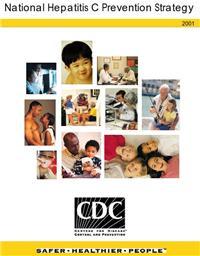This comprehensive plan for health care professionals and policy makers addresses the prevention and control of hepatitis C virus (HCV) infection and its consequences. This strategy strives to protect the public's health by outlining guidelines for prevention and control of HCV infection, providing credible information on hepatitis C to enhance healthy decisions and promoting healthy living through strong partnerships with national, state, and local organizations in both the public and private sectors. The principle components of the plan are: (1) education of health care and public health professionals to improve the identification of persons at risk for HCV infection and ensure appropriate counseling, diagnosis, medical management and treatment; (2) education of the public and persons at risk for infection about risk factors for HCV transmission, and the need for testing and medical evaluation; (3) clinical and public health activities to identify, counsel, and test persons at risk for HCV infection and medical evaluation or referral for those found to be infected; (4) outreach and community-based programs to prevent practices that put people at risk for HCV infection, and to identify persons who need to get tested; (5) surveillance to monitor acute and chronic disease trends and evaluate the effectiveness of prevention and medical care activities; and (6) research to better guide prevention efforts.
Format:
Report
Publication Date:
2001
ID:
30778
- Physicians


